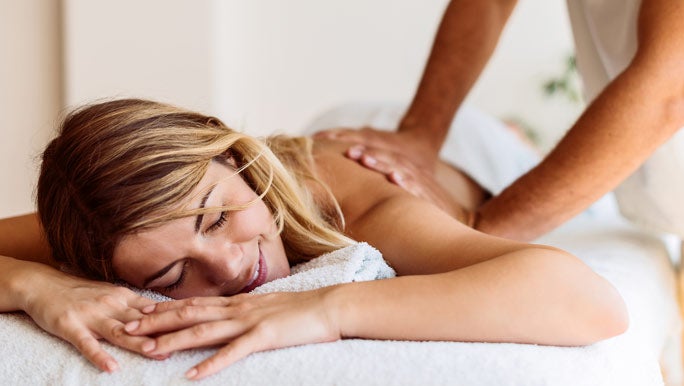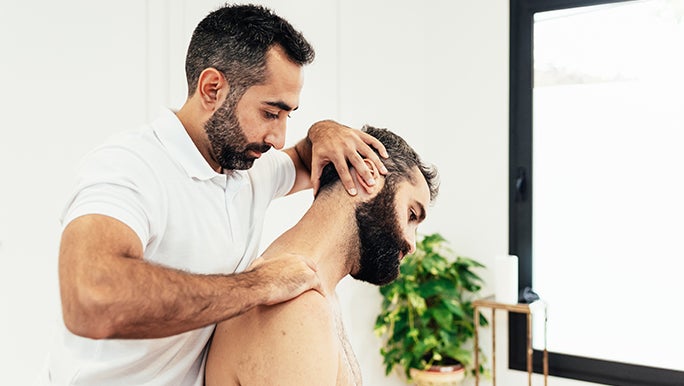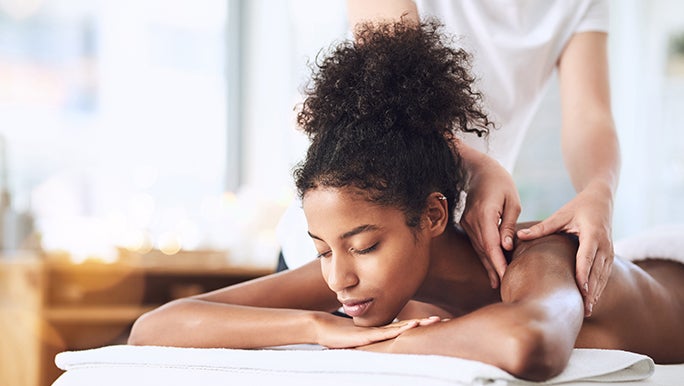What is remedial massage?

The origins of massage therapy are a bit vague, but some of the earliest recorded mentions of massage are at least 5000 years ago from the ancient cultures of China and India.
Massage therapy has evolved since then. Today, there are many different types of massage. They may draw upon various traditions, techniques and tools, but they often retain the same fundamentals.
The aim of remedial massage is to help ease muscle discomfort, and support recovery from illness or injury.
Remedial massage therapy may support overall wellness symptoms of:
- neck, shoulder or back discomfort
- headaches
- sports or other injuries

Your massage therapist will either use a firm, medium or light pressure, depending on the area and problem muscle.
What happens during a remedial massage?
At the start of your appointment, your massage therapist will usually talk to you about any pre-existing conditions and your overall health. They’ll also talk to you about areas of concern and how they plan to work with you.
Then you’ll hop up onto a massage table and cover yourself in a towel. Then your massage therapist will check if you’re ready and adjust the towel so they can access whichever part of your body they’re starting on.
They’ll then add massage oil to their hands before starting to massage the area. Remedial massage is specifically designed to find and restore muscles that are damaged, hopefully helping them to recover faster.
Your massage therapist will either use a firm, medium or light pressure, depending on the area and problem muscle.
A Remedial Massage should feel relaxing and releasing.
What should I wear to a massage?
Feeling comfortable should always be the main aim during a massage, so discuss with your therapist how much clothing is needed and what you feel comfortable removing. For some massages, such as Thai massage, you actually remain clothed but it’s important to wear flexible clothing due to the massage techniques used.
Do I need to have a shower before a massage?
It’s always nice to be clean when dealing with other people, especially when the massage therapist can get quite close and personal. If you’re having a massage that uses oils, clean skin will absorb the oil easier.

If at any time during your massage the pressure isn't right or you need to move, speak up.
What information should I tell my massage therapist?
Communication is very important so your therapist can focus on any particular area of sensitivity. They may be able to feel areas that need attention if there are tight muscles. Inform them about any pre-existing health conditions or physical injuries so they can tailor your massage to your specific needs.
It’s also important to let them know if you’re pregnant, no matter what stage you’re at. There are specific massage techniques that can be beneficial, especially during the later stages of pregnancy. Telling them before your appointment gives them the opportunity to organise special equipment, such as a table with a supported hole for your belly to go through.
Do I have to make small talk with my massage therapist?
Some people like to have a chat while having a massage. Others like the peace and quiet to aid their relaxation. Don’t feel shy about telling the therapist what you would prefer. It’s your massage and you should feel comfortable during your session.
If at any time during your massage the pressure isn't right or you need to move, speak up. Your therapist will usually check in with you about the pressure, but you don't have to wait for them to ask.
What about other types of massage and handheld massagers?
Remedial massage is only one of many types of massages available. Depending on your personal requirements, you may benefit from a different type of massage.
Alternative types of massages could include:
Swedish massage
This massage focuses on long sweeping strokes and is aimed at relaxation and superficial tension.
Hot stone massage
Involves heated stones which are used as part of the massage as well as being placed on particular parts of the body.
Shiatsu
Where therapists use hands, arms, even elbows and feet to work through the tension and release the blocked channels to allow the qi to flow freely.
Reflexology
Focuses on the feet. It’s believed the body is mapped out on the soles of your feet. Using specific pressure points may help ease issues elsewhere on your body.
Myofascial release
This technique works on the connective tissue using sustained pressure to lengthen and stretch the fascia.
Handheld massagers
Handheld massagers come in all shapes and sizes. They can be as simple as a foam roller that you roll your muscles over. Or as high-tech as the handheld massagers that can deliver over 3000 pulses per minute with different heads to target various muscles.
As with more traditional massages, you need to find a handheld massager that works for your needs. Make sure you do your research and follow the instructions to maximise the benefit. If you find your need to use a handheld massager increases, you should consult a GP or trained professional in case there is a bigger issue that needs to be addressed.
What are the other health benefits of remedial massage?
While remedial massage has the potential to relieve discomfort, it may also be a way to reduce stress and aid relaxation.
So, including regular massages in your wellness routine may not only assist with physical aches but may also help support your overall wellbeing.
Related:
- What is a weighted blanket?
- How can I help my kids be more resilient?
- How to overcome challenges when life hits a speed bump
Reviewed by the healthylife Advisory Board July, 2021.